|
|
|
Sort Order |
|
|
|
Items / Page
|
|
|
|
|
|
|
| Srl | Item |
| 1 |
ID:
128428
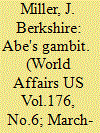

|
|
|
|
|
| Publication |
2014.
|
| Summary/Abstract |
China's aggressive actions in the East China Sea, combined with other factors, especially North Korea's continuing intransigence, have created an increasingly hostile security environment for Japan. Its response to these events can be seen in the impressive political rebirth of Shinzo Abe and the Liberal Democratic Party. While Abe, currently serving as prime minister for a second time, was elected largely because of his economic policies and the ineptitude of the formerly ruling Democratic Party of Japan, he has used his mandate to press forward with long needed, albeit controversial, defense and security reforms that indicate the seriousness with which Tokyo takes its current situation. With China looming up in front of them, and Pyongyang posing lesser but still worrisome threats, the Japanese have become acutely aware of the fact that their Self-Defense Forces (SDF) have one hundred and forty thousand ground troops, one hundred and forty-one maritime vessels, and four hundred and ten aircraft, while China's People's Liberation Army has one million six hundred thousand troops and North Korea has one million soldiers. Meanwhile, North Korea maintains a significant, if decaying, navy and air force, with one hundred and ninety vessels and approximately six hundred aircraft. China's much more capable maritime and air assets include nine hundred and seventy vessels and two thousand five hundred and eighty aircraft.
|
|
|
|
|
|
|
|
|
|
|
|
|
|
|
|
| 2 |
ID:
130613
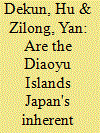

|
|
|
|
|
| Publication |
2014.
|
| Summary/Abstract |
"Historians believe that historical essays have nothing to do with the science of history and are actually harmful. Indeed, authors of such essays, whether intentionally or unintentionally, leave traces of themselves and their time. The same is true of editorials and reviews found in today's newspapers." ' The Origins of the Japan-China Territorial Issue, a new book by Mr. Murata Tadayoshi, an honorary professor at Japan' s Yokohama National University is also an example of what the Contemporary Historian, Mr. Chen Yinke, was referring to in the above. It is common knowledge that after Japan's Noda cabinet adopted its "nationalization" policy over the Diaoyu Islands on September ll, 2012, the Sino-Japan relationship began a downward spiral, while rivalry between non-govemment groups from both nations escalated. The Diaoyu
Islands dispute has become a hot topic for both the media and academia. Among the many works on the topic, Professor Murata's is quite unusual. While tensions remain high between China and Japan, his book carries an impressive argument as shown by work's subtitle-FaZsz?ed Facts in Japanese Government Papers. The cover of the book also features the question--"Are the Diaoyu Islands an inherent part of Japan's territory?"
|
|
|
|
|
|
|
|
|
|
|
|
|
|
|
|
| 3 |
ID:
131843


|
|
|
|
|
| Publication |
2014.
|
| Summary/Abstract |
As relations between Japan and China change due to a paradigm shift that has occurred over the past few years, the need for a new security outlook and world view has emerged. In East Asia, the foundation for the relationship between Japan and China must be fairness and justice, and the rule of law. This article proposes ways that Japan and China can work to cultivate common ground that would bring forth the possibility of a new Japan-China relationship based on the "strategic reciprocal relationship" established in 2006.
|
|
|
|
|
|
|
|
|
|
|
|
|
|
|
|
| 4 |
ID:
120523
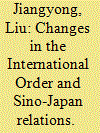

|
|
|
| 5 |
ID:
131846
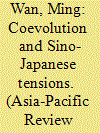

|
|
|
|
|
| Publication |
2014.
|
| Summary/Abstract |
Unlike those who blame the other side or structural forces beyond one's control for the current Sino-Japanese tensions, this paper offers a theoretical insight about the coevolution between China and Japan to explain why the two Asian great powers that had a better relationship in the past are now experiencing greater tensions when their much closer economic and people-to-people ties should facilitate greater cooperation. The two nations have coevolved over millennia with increasing intensity over time. They avoided serious tensions in the 1970s-1990s partly thanks to each being situated in a different niche. But that separation has diminished in a globalizing world and the two countries are becoming more integrated, which has triggered a backlash. The earlier generation of proponents of Sino-Japanese friendship succeeded in forging strong economic and social ties, but the current generation finds it difficult politically and psychologically to manage the new reality in their relations.
|
|
|
|
|
|
|
|
|
|
|
|
|
|
|
|
| 6 |
ID:
106567
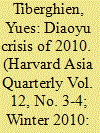

|
|
|
| 7 |
ID:
131384
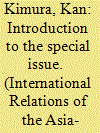

|
|
|
|
|
| Publication |
2014.
|
| Summary/Abstract |
In recent years, East Asian countries have faced serious challenges with regard to regional security. The bilateral relationships between China and Japan, and Japan and South Korea, have become increasingly strained due to a variety of disagreements over key political issues, such as territorial claims. Some observers argue that China and Japan may become involved in a direct military confrontation in the near future over the Senkaku/Diaoyu Islands. The increasing levels of naval and aerial engagements between the two countries demonstrate that such arguments can no longer be seen as 'out of the question'. While two democracies in the region, Japan and South Korea, are both major alliance partners with the United States and share the key security concern of countering North Korea's nuclear and conventional provocations, the two have suffered deteriorating relations since 2012. For instance, the General Security of Military Information Agreement, which provided a mechanism through which Japan and South Korea could share military technology, was canceled in July 2012. Furthermore, the two states have been embroiled in an increasingly antagonistic territorial dispute over Takeshima/Dokdo Islands since President Lee Myung-bak's visit to the islands in August 2012.
|
|
|
|
|
|
|
|
|
|
|
|
|
|
|
|
| 8 |
ID:
128259
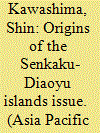

|
|
|
|
|
| Publication |
2013.
|
| Summary/Abstract |
Although news accounts cover the Senkaku/Diaoyu Islands issue, rarely is historical background given. This article focuses on Taiwanese diplomatic documents dating from after World War Two through the early 1970s, the period before Japan-China diplomatic relations were normalized, to try to clarify the timeline of when the Senkaku/Diaoyu Islands became a diplomatic issue.
|
|
|
|
|
|
|
|
|
|
|
|
|
|
|
|
| 9 |
ID:
133968
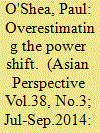

|
|
|
|
|
| Publication |
2014.
|
| Summary/Abstract |
In 2009 the Democratic Party of Japan came to power promising a foreign policy shift, aiming for a more equal relationship with the United States and improved relations with Japan's Asian neighbors. The policy shift was explicitly designed as a response to a perceived regional and global power shift from the United States to China. However, within nine months the new prime minister, Hatoyama Yukio, resigned, and his successors jettisoned the foreign policy shift. Conventional explanations cite the weak leadership of Hatoyama, the inexperience of his party, and the lack of realism behind the proposed policy shift itself as key factors in the shift's failure. In this article I provide an alternative perspective. Drawing on the concept of discursive power, I demonstrate how Washington turned the Futenma base relocation and other issues into a major crisis in Japan-US relations in order to discredit Hatoyama and the policy shift. What was arguably a modest and pragmatic policy shift was narrated as a grave threat to the very cornerstone of postwar Japanese security. By focusing on the US exercise of discursive power over Japan, I suggest that talk of an East Asian power shift is premature.
|
|
|
|
|
|
|
|
|
|
|
|
|
|
|
|
| 10 |
ID:
092414
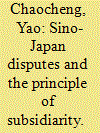

|
|
|
|
|
| Publication |
2009.
|
| Summary/Abstract |
Regional economic unification must overcome some economic obstacles, such as how to remove the trade and non-trade barriers, how to realise monetary stability in the region and how to develop a regional market, dominated by internal demand. However, in the long run, social obstacles will be more troublesome than the economic obstacles and could also be counterproductive. The integration process in Asia has been lagging behind the other continents of Europe and North America for many reasons. One of them is that the Asian unification process has mainly been a top-down approach by politicians and leaderships in this region, without wider and broader participation from the societies and civil groups. Nonetheless, there are strong trends favouring the ongoing regional cooperation in Asia. While envisioning bright prospects, the Asian economic integration process, however, is destined to encounter social obstacles. One of them is clearly the Sino-Japan dispute. The article argues, that the principle of subsidiarity (bottom-up approaches) (Horst Rolly 2003) being applied in European unification, may serve as the key solution-and strategic approach-to improve Sino-Japan relations. Asian nations, especially China and Japan, could draw on the lessons and experiences of European countries and adapt from their principle of subsidarity, which may serve to overcome the impending obstructions. Otherwise, the Sino-Japan dispute may become the largest barrier in building up the regional cooperation structure in Asia.
|
|
|
|
|
|
|
|
|
|
|
|
|
|
|
|
| 11 |
ID:
133178
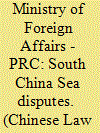

|
|
|
|
|
| Publication |
2014.
|
| Summary/Abstract |
This double issue of Chinese Law and Government highlights the origins, key features and implications of the current and outgoing dispute over the South China Sea with 128 documents that span from the San Francisco Peace Conference in 1951 to statements of the PRC ministry of Foreign affairs in 2013
|
|
|
|
|
|
|
|
|
|
|
|
|
|
|
|
|
|
|
|
|